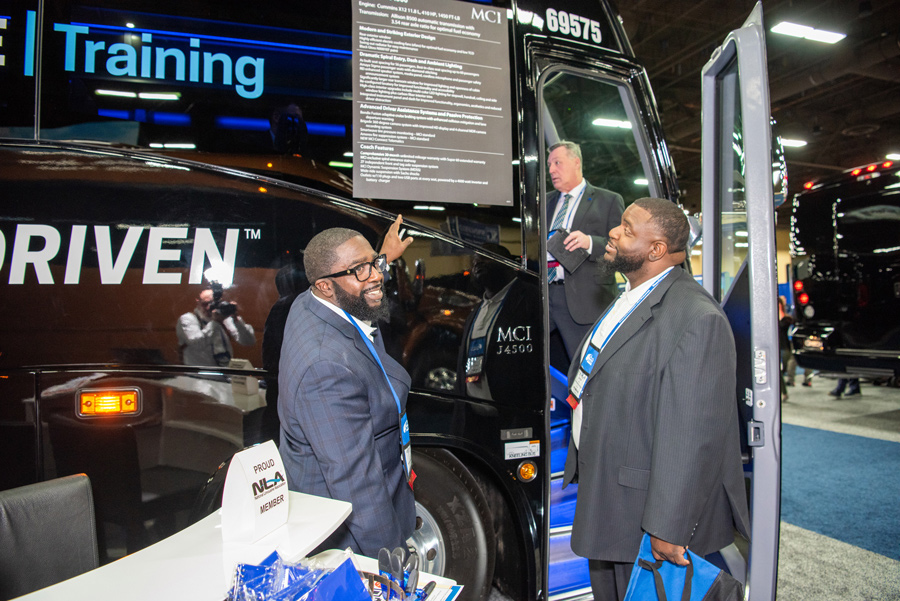Key To Your Recovery: Making the Most of Your Trade Show Experience
- Details
BY KEN LUCCI
Our industry and economy has lived through the equivalent of the worst category 5 hurricane in history—and while hobbled, thousands of chauffeured operators are still standing, rebuilding their infrastructure, dealing with many new challenges, and fighting back strong.
 Events like the upcoming CD/NLA Show in Texas on October 10-13 are an opportune time not to lament our recent dark period, but to forge ahead and jump-start a very bright future for our businesses. While there will be plenty of time to mingle with friends, share stories, and socialize, it should be much more than that. Events like this are a golden opportunity to figuratively brush ourselves off, shine ourselves up, and convey to the industry that our businesses are back with vigor, and we are serious about moving forward into a profitable future.
Events like the upcoming CD/NLA Show in Texas on October 10-13 are an opportune time not to lament our recent dark period, but to forge ahead and jump-start a very bright future for our businesses. While there will be plenty of time to mingle with friends, share stories, and socialize, it should be much more than that. Events like this are a golden opportunity to figuratively brush ourselves off, shine ourselves up, and convey to the industry that our businesses are back with vigor, and we are serious about moving forward into a profitable future.
When the immediate pandemic storm finally passes, developing and executing a thorough business recovery plan that details exactly how we are going to build back profitably is crucial. On many levels, we may find that the ways we did things pre-pandemic (and perhaps with whom) may not work well for us in the future. These industry events, including the CD/NLA Show, will be instrumental to help find solutions to current operational challenges, embrace new ideas to operate more efficiently, and assess how changes in the overall industry landscape may affect how our businesses move forward into the permanent new normal.
 Attending live events again will send a positive message for your company—and it is a badge of honor of sorts. Just by appearing, it will prove that your business has survived the perils of the past two years and you are still open and operating, albeit with many new challenges. For this alone, we all should be walking tall and proud.
Attending live events again will send a positive message for your company—and it is a badge of honor of sorts. Just by appearing, it will prove that your business has survived the perils of the past two years and you are still open and operating, albeit with many new challenges. For this alone, we all should be walking tall and proud.
It’s also an opportunity to demonstrate to the industry how serious you are about growing back profitably, not just to survive but rebuilding to THRIVE!
Here are a few suggestions to make the most of your time away from the office to convey to your peers that you are back and ready to roll:
- Create a written itinerary or outline: Consult the published show agenda online, read about each session, and make an outline of the events you must attend and which ones you would consider optional. Review the list of exhibitors, determine who you would like to spend quality time with, and exactly what you want to accomplish. It is never a bad idea to email them prior to check availability in order to set aside some time with them.
- Add to your itinerary challenges, problems, or opportunities you would like data on: Beside the events you would like to participate in and who you wish to see, perhaps consider including a list of operational challenges, specific problems, and even opportunities you would like to gather data on to address and implement when you get back home.
- First, plan your message and how you will communicate: Part of positive messaging is being prepared with a brand-new set of business cards with up-to-date contact information and a current fleet and services line card. It never sends a positive message when you must cross off vehicles you don’t have any longer or correct your phone number or address on a business card.
- Renew and assess your most critical revenue generating business partnerships: If part of your rebuilding plan is serving clients who travel nationally, this show is a perfect opportunity to gauge how your existing affiliates are building back, and what condition they are in both in fleet capacity and internal operations to serve your needs. Asking key questions to determine their situation may decide if you need additional partners in that area. The same can be said for assessing how all your vendors are building back and considering whether there are any changes you need to know about.
- Forging new alliances, develop new partnerships: Focus on meeting with people who represent business development and profitable revenue opportunities. Whether part of your rebuilding strategy is taking on more farm-in work or, conversely, you wish to expand by providing national or global service to your existing clients, make a list of cities that you can draw work from or locations where you need affiliates and start arranging connections by email before the show.
- Have an open mind to new ideas: Maximizing efficiency; implementing streamlined processes; and creating new ways to do things better, faster, and less expensively will be paramount to executing your business strategy, regardless of how you plan on marketing. Be on the lookout for ways to utilize technology, streamline staffing or processes, and eliminate waste to reduce foundational expenses in order to squeeze more profit out of each transaction.
Then focus on the positives and be ready to verbalize how you are building back fast and strong. Whether speaking to someone who knows you well, or talking to a new potential partner, it is crucial to position your company as ready to serve today, and only getting stronger. The show is not about what you lost because of the pandemic; it’s about how you manage the recovery. Perhaps create talking points about new fleet, returning staff, new opportunities, etc.
Unfortunately, what we did in the past may not be financially feasible during the recovery and into the future, so listen for new ways to become much efficient and more profitable. Part of the new normal will be worrying much less about top-line growth, and more about bottom-line profitability as capacity builds back slower than demand.
A final suggestion may be to look at your first post-recovery show as if you are a player coming back into the arena after sitting out a season or two with an injury. Don’t dwell on the hurt or recount the last game you won. Instead, show how you are healing and ready to play on new turf, while assessing other players, reacclimating yourself with the fundamentals and being open to new strategies and tactics to help you win. Good luck and GAME ON! [CD0921]
Ken Lucci is a consultant to the chauffeured transportation and hospitality Industries. He can be reached at Klucci@drivingyourincome.com.

